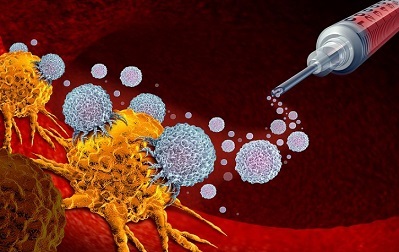Texas MD Anderson Cancer Center Warns That COVID-19 mRNA Vaccines Elevate PD-L1 Levels, Disrupting Lung Cancer Treatments, Progressing Other Cancers!
Nikhil Prasad Fact checked by:Thailand Medical News Team Feb 04, 2024 2 years, 2 weeks, 3 days, 7 hours, 54 minutes ago
Medical News: In the ongoing battle against the COVID-19 pandemic, mRNA vaccines have played a pivotal role in curbing the spread of the virus. However, recent research from the University of Texas MD Anderson Cancer Center-USA has shed light on a potential complication for patients with advanced non-small cell lung cancer (NSCLC). The study suggests that mRNA COVID-19 vaccines may elevate the levels of PD-L1 expression, impacting the effectiveness of immune checkpoint inhibitors in treating NSCLC.

Researchers from MD Anderson presented their findings lats year during the 2023 World Conference on Lung Cancer in Singapore last September.
https://cattendee.abstractsonline.com/meeting/10925/Session/114
(look at presentation MA.15.04 Dr A. Grippin.)
The abstract is published in the peer reviewed Journal of Thoracic Oncology.
https://www.jto.org/article/S1556-0864(23)01024-9/fulltext
The full study was never published as it was speculated (We have no evidence if this speculation is valid or not as it came from a staff member of the center that wishes to remain anonymous) that there was intense lobbying by certain pharma companies that have been supporting the University and the cancer center. There were also speculations that attempts were made to prevent media coverage of this important findings. (however there are other teams in various countries working on similar research and more data will be released soon which shows not just PD-L1 levels being affected but also other oncogenic genes are also elevated while tumor protective genes are being downregulated!)
This
Medical News report delves into the findings of this research by MD Anderson, exploring the implications for lung cancer treatments and the potential repercussions for other cancer types.
Understanding PD-L1 Expression and Immune Checkpoint Inhibition
PD-L1, or programmed death-ligand 1, is a protein that plays a crucial role in regulating the immune system. In the context of cancer, increased PD-L1 levels can create an immunosuppressive microenvironment, allowing cancer cells to evade detection and destruction by the immune system. Immune checkpoint inhibitors, such as anti-PD-1/PD-L1 therapies, have emerged as a promising treatment for advanced NSCLC by blocking the PD-1/PD-L1 interaction and unleashing the immune system to target cancer cells.
The Research Findings
Dr Adam Grippin and his colleagues at the University of Texas MD Anderson Cancer Center conducted a comprehensive study to investigate the impact of mRNA COVID-19 vaccines on PD-L1 expression in patients with advanced NSCLC. The research involved the analysis of biopsy samples from 2216 NSCLC patients who had undergone biopsies between January 2017 and August 2022.
The patients were divided into four groups based on the interval between COVID-19 vaccination and the biopsy date. Notably, the study revealed a significant association bet
ween the time elapsed since vaccination and the PD-L1 tumor proportion score (TPS). Patients who had a biopsy 70-99 days after COVID-19 vaccination exhibited a substantially higher average PD-L1 TPS (40%) compared to those who had a biopsy 0-69 days from vaccination (25%) or 100 or more days from vaccination (21%).
Furthermore, patients in the 70-99 days group demonstrated a higher proportion of samples with a PD-L1 TPS of 50% or higher, indicating a potential impact on the clinical management of these patients. The study emphasized that the elevation of PD-L1 expression was time-dependent, prompting the need for further investigation into the underlying mechanisms and the relationship between the timing of COVID mRNA vaccines and clinical responses to immune checkpoint blockade.
Implications for Lung Cancer Treatment
The observed increase in PD-L1 expression following mRNA COVID-19 vaccination raises important considerations for the treatment of advanced NSCLC. The effectiveness of immune checkpoint inhibitors, which relies on the inhibition of the PD-1/PD-L1 interaction, may be influenced by the heightened PD-L1 levels induced by the vaccine.
Dr Grippin highlighted the potential significance of these findings in the clinical setting. The elevated PD-L1 expression could potentially restore sensitivity to immune checkpoint inhibition in patients with resistant NSCLC, providing a valuable avenue for further research and personalized treatment strategies.
Broader Impact on Cancer Progression
Beyond NSCLC, the implications of elevated PD-L1 expression extend to various other malignancies. The immunosuppressive tumor microenvironment created by increased PD-L1 levels may facilitate the evasion of cancer cells from immune surveillance and lead to accelerated progression in cancers such as hepatocellular carcinoma, pancreatic cancer, gastric cancer, renal cell cancer, esophageal cancer, and ovarian cancer.
https://www.ncbi.nlm.nih.gov/pmc/articles/PMC4990391/
This suggests a need for a nuanced approach to vaccination strategies in cancer patients, considering the potential impact on the immune landscape. The findings prompt a reevaluation of the risks and benefits of mRNA COVID-19 vaccines in patients with existing cancer diagnoses.
Future Directions and Conclusion
The research findings from the opens new avenues for investigation into the intricate relationship between mRNA COVID-19 vaccines, PD-L1 expression, and the clinical outcomes of cancer patients. Understanding the mechanisms behind the time-dependent increase in PD-L1 levels is crucial for optimizing the use of immunotherapies in the context of vaccination.
Further research will be instrumental in delineating the precise impact of mRNA COVID-19 vaccines on the immune landscape of cancer patients, guiding the development of tailored treatment approaches and ensuring the optimal care for individuals facing both viral and oncological challenges.
For the latest
Medical News, keep on logging to Thailand Medical News.
